Rumbidzai remembers clearly when, in the first week of her job as a deminer, she wanted to run away.
She was a primary school teacher before looking for a new challenge, but as she began her first training session, she didn’t think she could handle it.
But by seeing the other women like her who had joined mine-clearance teams, she felt bolder. Why couldn’t she do it if others were, gaining promotions and supporting their families as she wished to?
So, she focused on her drills and as time went on felt more confident.
In the past, demining - or the process of removing landmines or other explosive items from the land after conflict - was very much a male-dominated job, deemed “too dangerous” for women.
“When the opportunity came, I wanted to join. To show to other men, women, supporters that us women can also be deminers” - Rumbidzai.
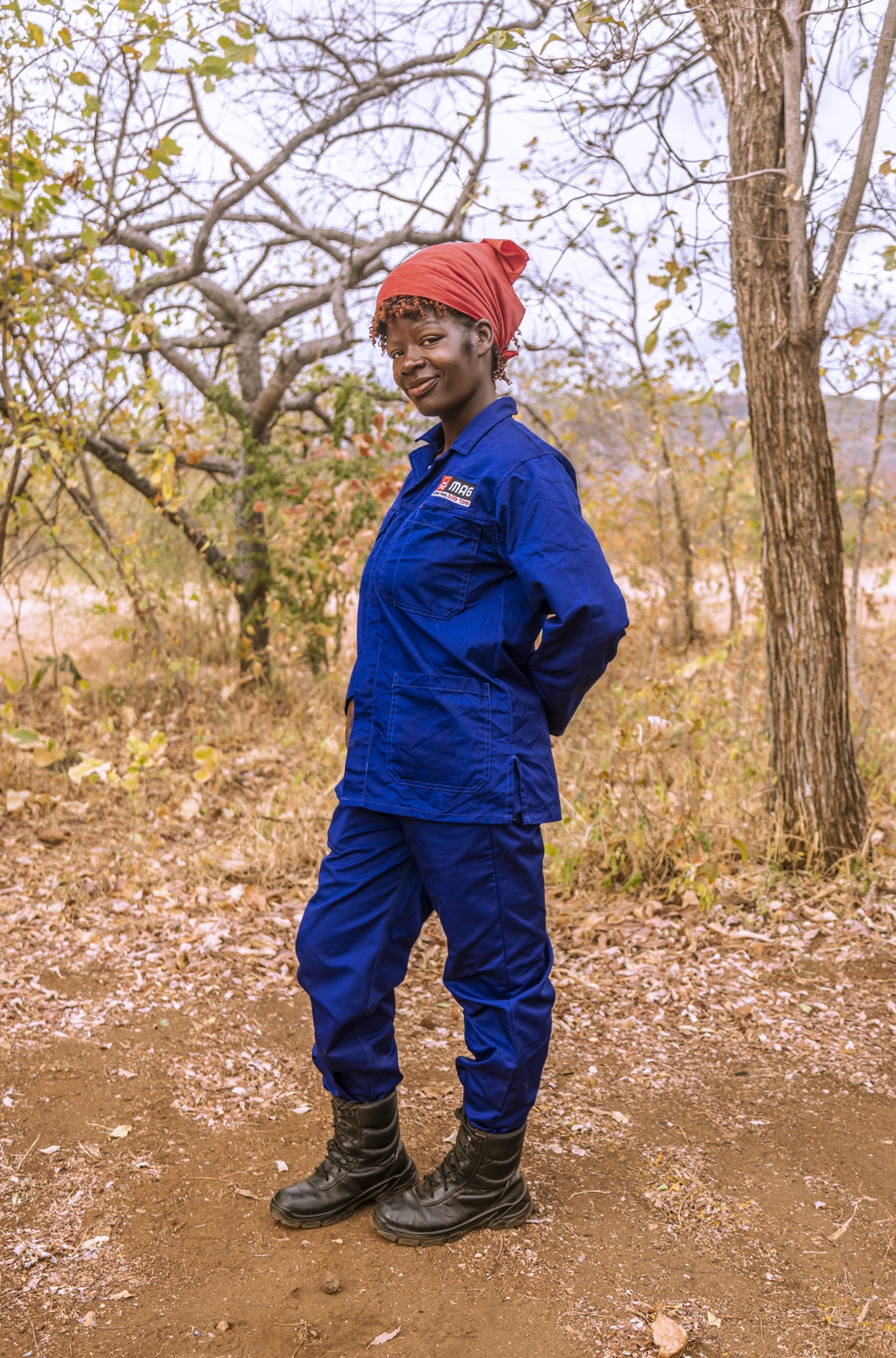
Fifty years on, landmines still litter Zimbabwe’s border with Mozambique: a legacy of the conflict between the Rhodesian Army and the Zimbabwe African National Liberation Army.
Since 2017, humanitarian organisation MAG (Mines Advisory Group) has been working in Zimbabwe to make land safe again for local communities. Based in the north-east of the country, the team live in tents in a permanent camp in Mudzi district during workdays, returning home for periods of leave.
Every morning, the female deminers, which make up about 40 percent of the personnel, rise with the first light and meet for their morning safety briefing: making sure their batteries are charged and their detectors ready. After the teams are allocated their areas of land, the supervisor does a final check that everyone feels up to the task of demining that day.
Between 1976 and 1979, an estimated 2.5 million anti-personnel mines were laid along the area where Rumbidzai and her team are currently working, shoulder to shoulder with neighbouring Mozambique. MAG has been tasked to clear a 12 million square metre stretch of this border minefield. Seven years on, only a little over 3.5 million square metres remains, and the ‘mine-free’ status is almost within reach.
Strengthening women’s participation in mine action, which has traditionally been a male-dominated sector, has been recognised in various international forums as a contributor to peace and security. From reclaiming land for their communities, leading risk education activities or interacting directly with affected communities, their unique role in this space is vital for effective operations.
Around the world, 15 people are killed or injured every day by landmines. Since demining operations began in this area of Zimbabwe, the last accident involving a member of the community was in 2018.
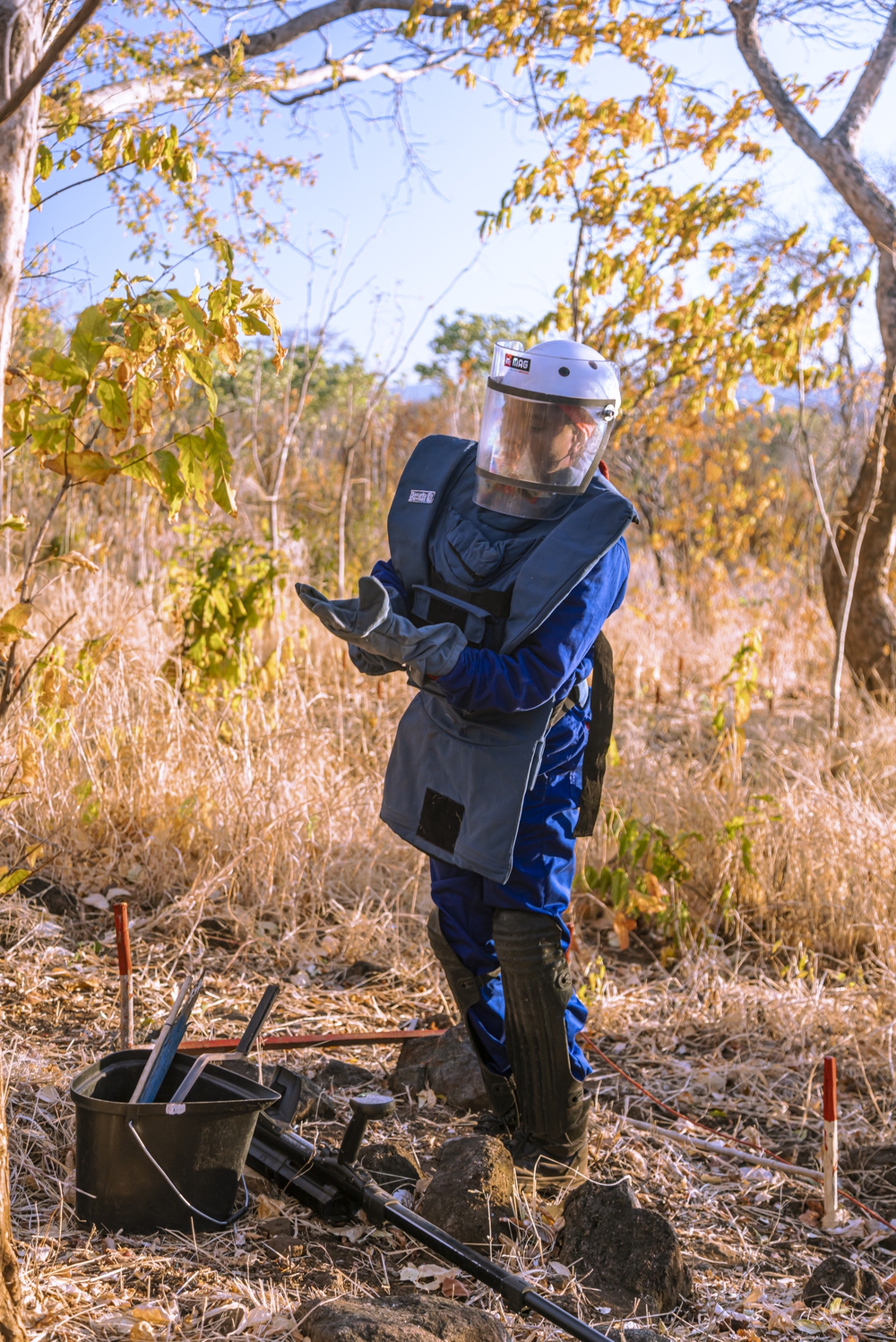
Melisa, a 22-year-old deminer, also from the Mudzi area, prepares for the day’s careful work. Each morning as the sun rises over the Baobab trees, she and her colleagues pull on their various layers of PPE (personal protective equipment): a heavy vest, helmet, visor, shin guards, thick gloves and boots, all designed to help them carry out their work safely. In the weaker winter light, the heavy kit feels less oppressive, although as Melisa reminds us, that’s not always the case.
“Sometimes the work is so hot, but I'm just happy to save lives”
Starting each morning as soon as it is light enough to do so, sometimes as early as 6am, she begins gently scouring the land with her detector until she finds a signal: meaning a landmine or other metal object is in the ground, possible inches beneath her feet. Then, she places down a red triangle to show a positive signal has been found, and painstakingly scrapes away the earth around it, starting about six inches away for safety, until the item is uncovered. As climate change impacts the country, increasing the number of droughts and making the already-arid land even harder, the teams now need extra water in order to soften the ground enough to excavate. Carrying in the heavy pitchers makes this process more strenuous, and even slower, and as temperatures soar in the summer months, sometimes it’s too hot to work at all.
A sharp whistle sounds, signalling the first morning’s break for the team. Tea and a small snack before the meticulous work continues until noon. Before they finish their shift, the team safely destroys all of the items found that day; the dull sound of explosions rippling in the air as the deminers return to camp.
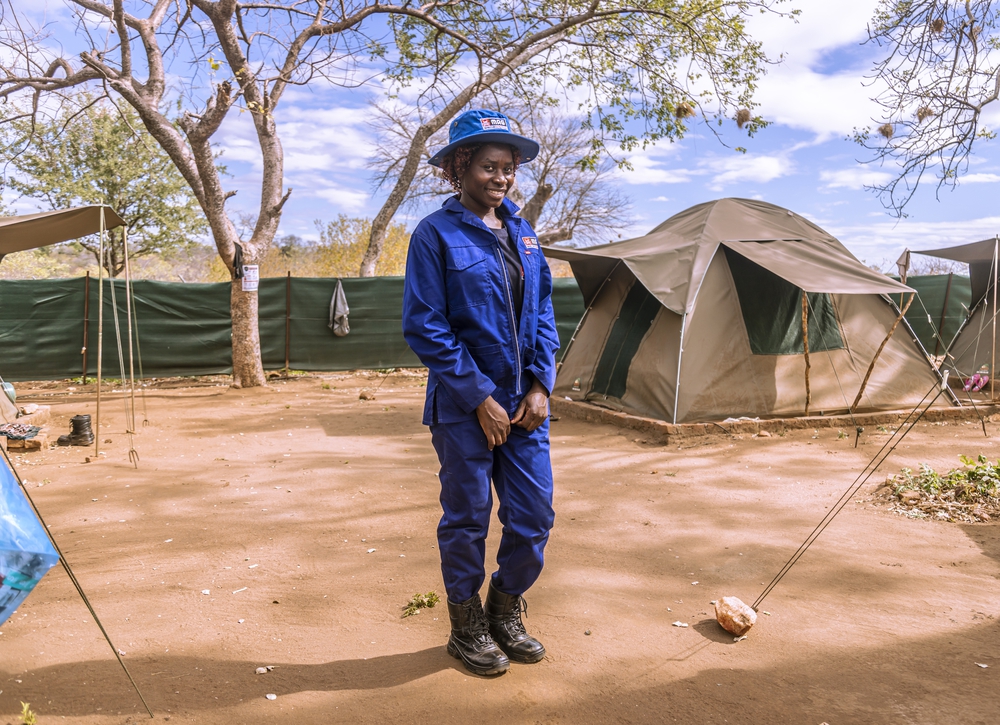
Just a few weeks ago, in June 2024, Ndaizvei was involved in a landmine accident.
“I was working together with my supervisor. I was at a distance so I didn’t know what had happened straight away.. all I remember is hearing a bang and taking cover. I laid down on the ground, facing down. When I looked up all I could see was dust. After some time, I called for my supervisor, Memory, but heard nothing. I was terrified she might have been killed.
I screamed and screamed again and finally saw some deminers coming towards us. We realised my supervisor had been badly injured and so started to bandage her hand there and then. I also had some scratches to my face. We were evacuated after that - the ambulance was thankfully nearby.”
The safety protocols and step-by-step processes for carrying out this dangerous work mean that these types of accidents are rare, yet they do still happen.
Doesn’t she feel scared to go back to work? “Yes,” Ndaizvei admits… “I need time to rest before I return to my work, but I need to for my family.”
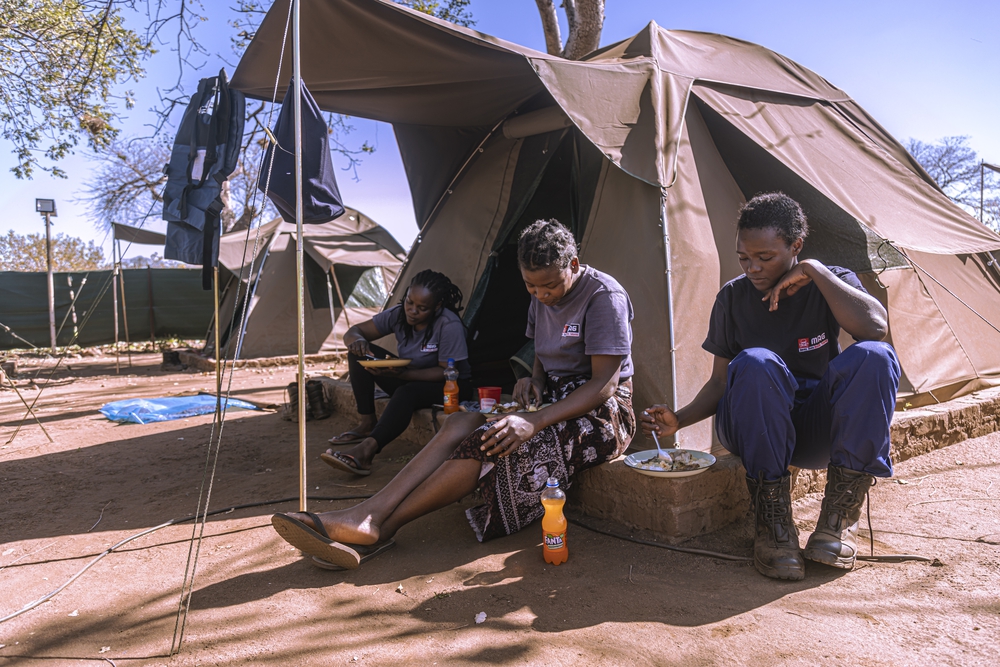
At lunch time, the women break off into smaller groups, often by their tents, to enjoy their meal after a morning in the minefields.
In the afternoons, they rest, look on social media, and talk to their families. It’s also the time for washing and prepping their equipment for the next day or taking part in the camp’s community projects.
As the Zimbabwean Mine Action Centre’s (ZIMAC) vision is for a landmine free country by 2027, the question of “what next” comes up for many of the women. The camp runs a number of initiatives for the deminers to build additional skills once they put down their metal detectors: gardening and growing crops, keeping chickens, and improving their cookery skills.
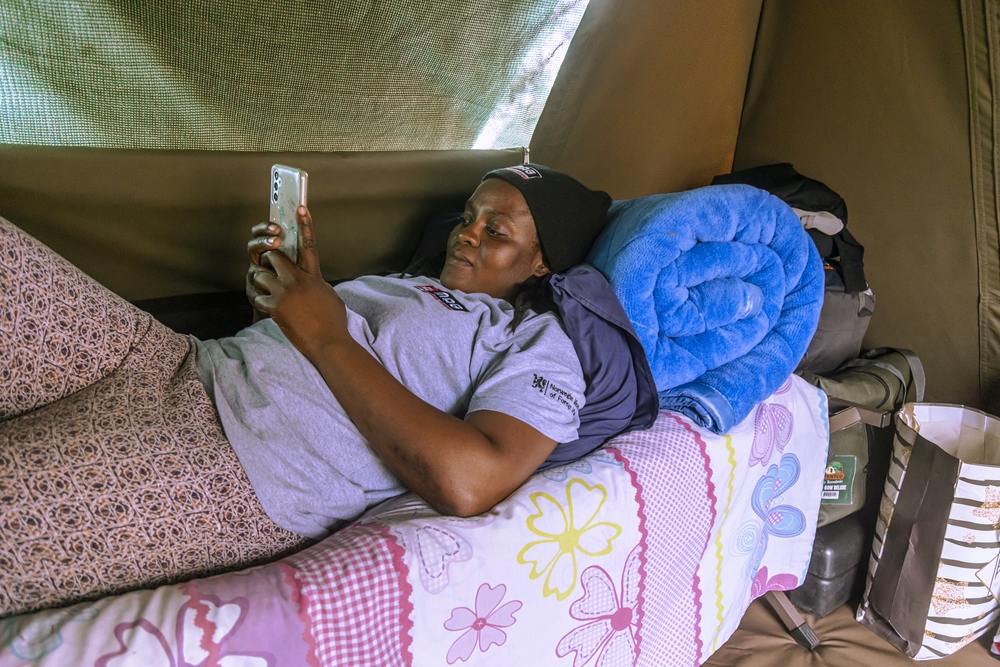
Until that time, the daily mission to return safe land back to the community here continues.
Tarisai, who has been a deminer for two years, explains more:
“Landmines have really affected this area along the border. People in this area don’t have access to Mozambique to do business. Their cattle have been involved in accidents, and so have some people. Land has been disturbed and people can’t farm.
Now that there is access to cleared areas, local people here are very happy.”
Not only do the women see the difference their work has at the community level, but also individually. The job brings in a steady, regular salary, higher than the average in the area. In the current economic climate and prolonged drought crisis in Zimbabwe, this can be a lifeline for families.
Tarisai continues, “at first my family were doubting, they didn’t feel like I could do it. Now, they are very proud of me. They depend on me. I am providing food for the table.”
Many of the women echo this sentiment: the best thing is saving lives, but after that - being employed and having their own financial freedom.
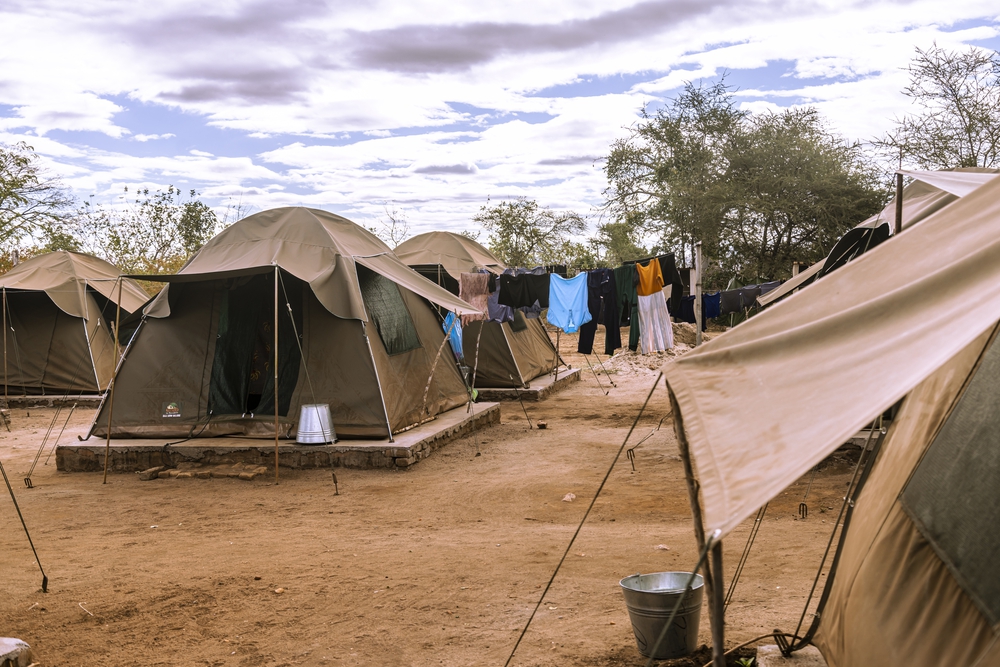
After darkness falls, the sound of crickets and an occasional snore is all you can hear in the camp. Solar lighting, and a sky full of stars, light the way for any night-time visit to the latrines.
85 deminers, medics, team leaders, drivers, cooks and cleaners call this place home for three weeks at a time, before a weeklong break. They all live on site in the camp during work periods due to the intense schedule and early starts, returning to their families for respite in between.
For many of the women, the sacrifice it takes to balance their careers as deminers and their family lives is evident. One of the women spoke about how her daughter now refers to her as “Mother 2”; her sister taking up the burden of motherly duties as she spends much of her time at work. For another, she misses her two-year old at home, who stays with a nanny when she is away.
But being able to provide for their families amid the current economic instability is important: “we don’t have the choice to choose our dream job. You have to take any opportunity you are given.” Mudzi district has one of the worst rates of poverty in the country and suffers from one of the highest rates of food insecurity.
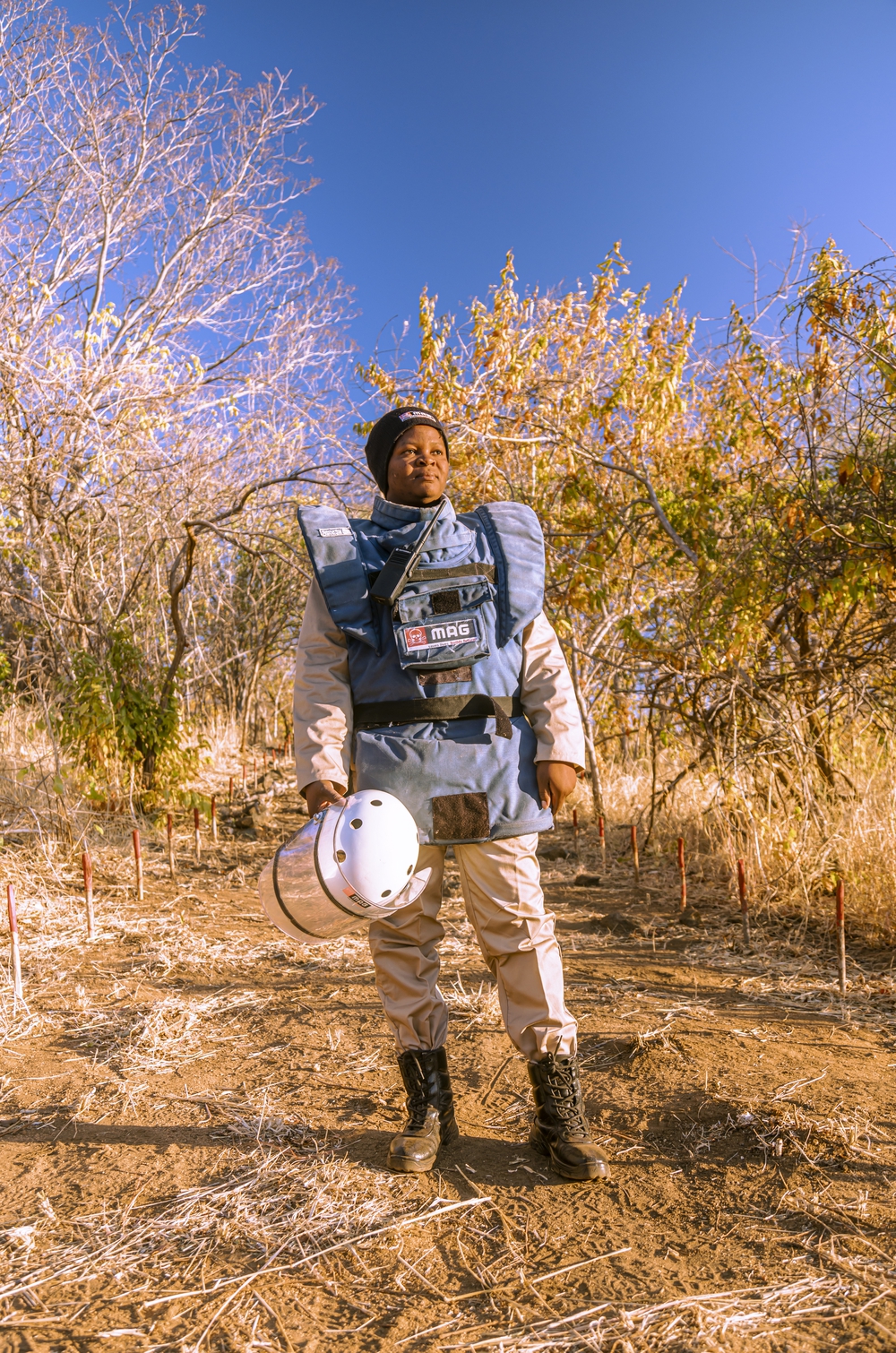
Paidamoyo, who is a Team Leader, showed us round the area her team is currently working in; safety pickets lined up behind her like matchsticks. She was recently promoted after 18 months as a deminer, now wearing a lighter coloured uniform to signify her rank, and with her tent in the ‘senior leadership’ area of camp. She leads her team and in the event of emergency, will take control of a situation.
As she speaks, you can see she is visibly proud of her work and the way she is able to provide for her family and her community. She shows other women that they too can rise up to more senior positions, in roles which had for a long time been perceived as “a man’s job”.
She heads back to check up on her team’s progress, Zimbabwe’s autumnal vegetation crunching underfoot.
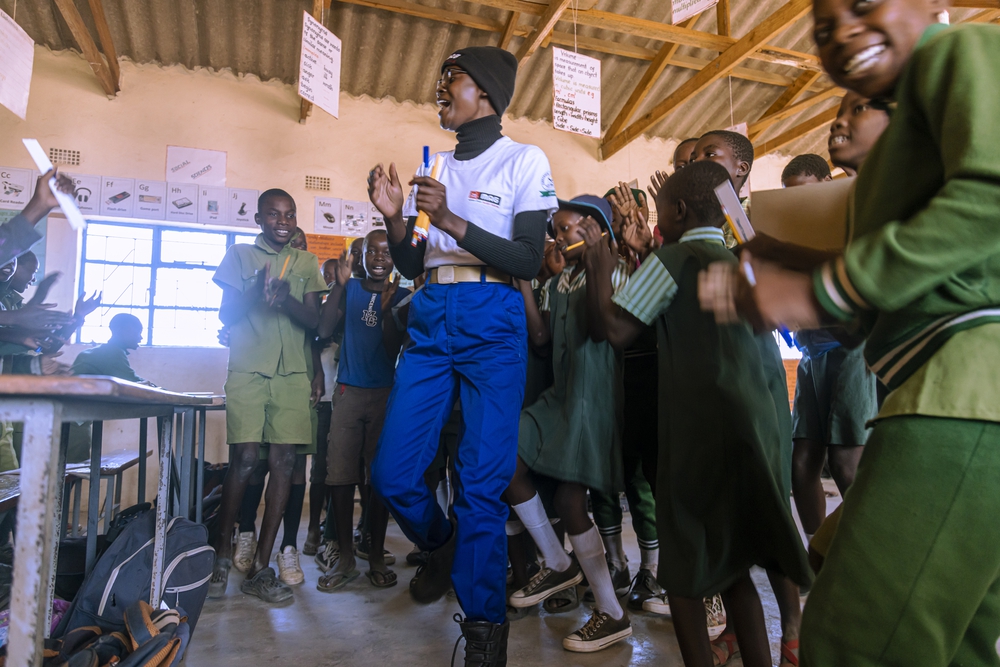
Alongside the demining efforts, MAG’s work in the community is just as important to save lives. Caren is a community liaison assistant for MAG, part of a team who visit local schools and community groups to spread the message that landmines can kill.
This school in Nyaugugu is attended by local Zimbabwean children, as well as Mozambicans who make the daily journey across the border (and the minefields) for their classes. Many people in the local area also have family or business on the other side of the border. For some, the nearest water supply is the other side of the treacherous expanse of land.
Prior to MAG’s arrival, there were no safe routes across the minefields, so children and adults would just have to hope they wouldn’t be the ones unlucky enough to stand on an unexploded item. Now, there are clear paths marked through the terrain: white-tipped pickets demarcate safe land, with red-tipped pickets signalling danger beyond.
Caren works in a team of three, encouraging school children to get involved with dances and songs, or the lure of a free ruler or notebook for answering a question right, all emblazoned with the reminder: “Don’t touch mines. Mines Kill”
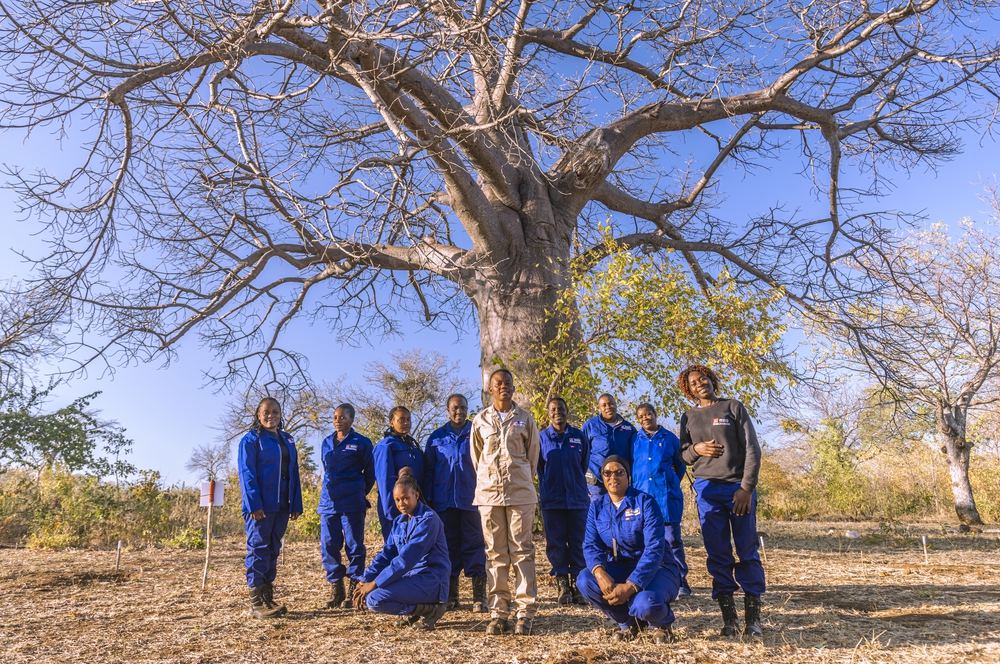
MAG’s all-female team talk about being a family; living, working and eating together during their stints in the camp.
Each month, with work that requires a combination of stamina and intense concentration, they are making new swathes of land across the area safe. One day, the hope is that all of this land will be declared ‘mine free’. Yet even if the need for mine action in the country trickles to nothing, it is clear that the determination these women feel will not.
Whether it’s representing their country in demining missions around the world or upskilling from an ambulance driver to a qualified medic, their dreams are big ones.
-----------------------------------------
This work is part of MAG’s efforts to shine a light on the role women play in helping their communities recover after conflict. Explore more on our dedicated microsite.
Photos: Yagazie Emezi





